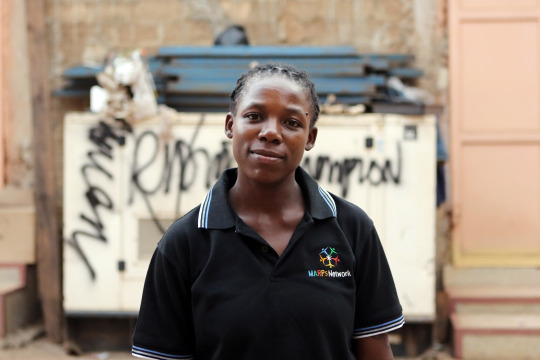#ugandan activists
Text
‘Very disturbing’: crackdown on oil pipeline protests in Uganda concerns UN rights expert
“In mid-September, four dozen university students marched through Kampala, the capital city of Uganda, to deliver a petition to parliament calling on the government to end fossil fuel investments and scrap the 900-mile east Africacrude oil pipeline (Eacop) ... Police officers refused to let them enter parliament. Most were chased away, but four male students were corralled under a table near the main entrance, where they say police kicked and punched them, and beat them with wood.
“After the beatings, the students were handcuffed and taken to a police station, where they say officers accused them of having been paid to protest against the pipeline. The four students spent the weekend in one of the city’s most notorious and overcrowded prisons, before being charged with public nuisance and released on bail.
“‘Young people are the majority in our country and we are the most vulnerable to the climate crisis. But anyone rising up against Eacop is facing the brutal wrath of the regime,’ said Magambo, who suffered a dislocated ankle and damage to his left eardrum. ‘It is a laughable case, but they want to keep us busy in court so that we can’t organize and protest. But we have to join the global community’s fight against fossil fuels,’ he said.
“Last month’s arrests were the latest in a wave of criminal charges and other judicial harassment against activists and organizations, raising concerns about the environmental and social impacts of the east African pipeline – which is one of the largest fossil fuel projects under construction in the world.”
#eacop#oil pipelines#fossil fuel infrastructure#ugandan climate activists#ugandan activists#climate activists#climate activism#activism#police brutality#police crackdown#government crackdown#human rights abuses#authoritarianism#freedom of assembly#right to protest#human rights#fossil fuels#climate crisis#climate#uganda
7 notes
·
View notes
Text

Cleopatra Kambugu Kentaro
Gender: Transgender woman
Sexuality: N/A
DOB: Born 1984
Ethnicity: Ugandan
Occupation: Activist
Note: In October 2021, she became the first Ugandan to have a change of gender legally recognized.
#Cleopatra Kambugu Kentaro#trans femme#trans rights#lgbt#lgbtq#transgender#trans woman#1984#african#black#poc#ugandan#activist#first#popular#popular post
129 notes
·
View notes
Text
Ugandan Lawyer and Human Rights Activist 34, Allegedly Stabs Her Husband to Death
Ugandan Lawyer and Human Rights Activist 34, Allegedly Stabs Her Husband to Death
A 34-year-old Ugandan lawyer and human rights activist, Francesca Amony, has been arrested for the alleged murder of her husband, Dr. Joseph Etuk. Amony, a senior member of the Democratic Party (DP) and a former National Secretary for the DP Women’s League, presented herself to Lacor police post in Bardege-Layibi division, Gulu city, after she allegedly stabbed the medical doctor to death.
The…

View On WordPress
0 notes
Text
Yesterday, here on tumblr, someone reached out to me, seeking help. And now I am here seeking yours. I don't care about your opinions and views. The matter of the fact is that everyone deserves to be treated as human beings, and they deserve the rights of human beings as we all do.
Right now, we have a violation of the LGBTQ+ community in Uganda after its government passed one of the harshest anti-gay laws, which includes punishment by death.
Here are two Al Jazeera articles on this:
1. Displaced twice: Gay Ugandans on the run face upheaval in Kenya
2. Ugandas anti lgbtq law causing wave of rights abuses activists say
Yesterday, @annoyingpaintertragedy (please take a look at their blog) reached out to me regarding this. They mentioned that many of Ugandas lgbtq civilians were forced to flee Uganda to neighboring Kenya. But situations are just as bad in Kenya. They spoke of the Kakuma refugee camps where they now live along with many other refugees.
I myself am just now learning of this. But if you have any information or links of organizations that may help regarding this situation, please send them to me or add them to the reblogs.
#uganda#homophobia#lgbtq#gay rights#lgbtq rights#same sex relationships#human rights#social justice#refugees#kakuma refugee camp#unhcr#united nations#kenya#african union#african nations#africa#south africa#important#signal boost#boost#lgbtqia
106 notes
·
View notes
Text
Uganda is Africa's most homophobic country. And the hatred unleashed there by the government and extremist religious groups has led to violence.
A prominent Ugandan LGBTQ+ activist is in a critical condition after he was stabbed on his way to work on Wednesday by unknown assailants on a motorbike.
Steven Kabuye, 25, suffered knife wounds and was left for dead in the assault on the outskirts of the capital Kampala before being found by local residents, police said.
Human rights defenders have been warning about the risk of attacks on members of the LGBTQ+ community after Uganda last year adopted what is considered one of the harshest anti-gay laws in the world.
Kabuye told detectives investigating the incident that he had been receiving death threats, according to a statement issued by police spokesperson Patrick Onyango.
“According to Mr Kabuye, two unidentified individuals on a motorcycle, wearing helmets, approached him. The passenger jumped off and attacked him, specifically targeting his neck with a knife,” Onyango said.
“Kabuye managed to shield his neck with his right arm, resulting in a stab wound to his hand. Despite attempting to flee, the assailants chased and stabbed him in the stomach and left him for dead,” he said, adding that local residents had found him and taken him to a medical clinic.
You can in certain instances get the death penalty for being gay in Uganda. The assailants probably felt it was their duty to try to murder Steven Kabuye.
In May last year, Uganda adopted anti-gay legislation containing provisions making “aggravated homosexuality” a potentially capital offence and setting out penalties for consensual same-sex relations of up to life in prison.
Homosexuality has long been illegal in Uganda under a colonial-era law criminalising sexual activity “against the order of nature”, with life imprisonment possible for a conviction. The new law added further offences and punishments.
Kabuye had posted on X that he was deeply concerned about the consequences of Uganda’s Anti-Homosexuality Act 2023. “This law violates basic human rights and sets a dangerous precedent for discrimination and persecution against the LGBTQ+ community. Let us stand together in solidarity and fight against bigotry and hate,” he wrote.
Uganda is a good place to avoid even if locals just think you are LGBTQ+.
Uganda's homophobic President Yoweri Museveni seized power in January of 1986. That's so long ago that the Space Shuttle Challenger was still intact when he began his reign as de facto president for life. According to the journal Foreign Policy, Museveni may be looking to turn Uganda into a North Korea-style monarchy without crowns.
Politics in Uganda has become a parable of dynastic decay. For 37 years, President Yoweri Museveni has ruled with a supporting cast of relatives, army officers, and hangers-on. They see themselves as the only ones capable of running the country—and have profited handsomely from doing so. Museveni has twice had the constitution rewritten to remove limits on his rule. But he is now 78, and he cannot rewrite biology.
Enter his 49-year-old son, Muhoozi Kainerugaba: a hard-drinking, trash-tweeting soldier who considers himself “the most handsome General on earth.” After a rapid promotion through the army ranks, Kainerugaba says he wants to run for president at the next election in 2026.
Uganda is part of the corrupt Axis of Homophobia which includes Russia and Iran. It deserves the same opprobrium which is directed at those decrepit régimes.
#lgbtq+#homophobia#steven kabuye#uganda#violence against gays#the axis of homophobia#yoweri museveni#muhoozi kainerugaba
35 notes
·
View notes
Text

Tomorrow, eleven Ugandan students will appear before a Kampala court for their activism against the planned East Africa crude oil pipeline (EACOP), one of the largest fossil fuel infrastructure projects currently under development globally. This is the latest in a series of harassment, threats, and arbitrary arrests against EACOP protestors.
These trials are part of a deeply concerning escalation of threats against human rights defenders in Uganda, particularly those raising concerns around oil development.
Police arrested the students last year, and according to media reports, beat them before remanding them to a maximum security prison. They are charged with the colonial era “common nuisance” offense, which Ugandan authorities have used to suppress legitimate protests.
Activists in Uganda oppose EACOP because of the risks it poses to the environment, local communities, and its potential contribution to climate change. And its construction coincides with a growing consensus amongst experts, including from the Intergovernmental Panel on Climate Change, that there cannot be any new fossil fuel projects if the world is to limit the worst impacts of climate change. [Human Rights Watch]
9 notes
·
View notes
Text

Jay Mulucha
Gender: Transgender man
Sexuality: Queer
DOB: N/A
Ethnicity: Ugandan
Occupation: Prof basketball player, activist
#Jay Mulucha#lgbt rights#trans rights#lgbt#lgbtq#transgender#trans man#queer#black#poc#african#ugandan#athlete#basketball#activist
143 notes
·
View notes
Text
11 African Books To Read in the Wake of Uganda’s Anti-Homosexuality Law
We find that books are a great way to process social and political events that seem very confusing and even disheartening. Books expand our knowledge and help us take informed and ethical position on issues. This week’s list responds to the recent anti-gay law passed in Uganda. We’ve put together 9 books by African writers that bring light to the struggle for LGBTQ freedom.
On March 21, Uganda passed the 2023 Anti-Homosexuality Bill, which criminalizes same-sex relationships in one of the world’s harshest anti-gay laws. According to this bill, people identifying as LGBTQ+ or promoting homosexuality in any way could be put in prison for up to 20 years. Further, any social behavior that falls under the category of “aggravated homosexuality” will result in a death sentence.
We have been thinking about what these anti-gay laws mean for African writers sharing queer experiences through literature or memoirs. In a Twitter conversation we had with Kenyan poet and activist Shailja Patel, Patel explains that the law will certainly stifle creative work centered on LGBTQ experiences:
The bill outlaws the “promotion of homosexuality,” and imposes criminal sanction on anyone who “advertises, publishes, prints, broadcasts, distributes” material, including digitally, that can be regarded as “promoting or encouraging homosexuality.” This is a blanket ban on LGBTQ characters or stories in Ugandan literature and culture…If queerness, queer people and queer expression can no longer exist in Ugandan literature, TV, films, music, art, theatre, dance, and media, then Ugandan culture is immeasurably impoverished.
We hope that this harsh and unfortunate law gets rolled back. In the meantime, here are 10 African books to read that powerfully celebrate the diversity and spirit of queer life and culture in Africa.
26 notes
·
View notes
Text
btw i hope people know that the "why are you gay?" meme comes from an interview in which pepe julian onziema, a ugandan lgbt activist, is being grilled by a homophobe who is confused by his identity as a (straight, asexual) trans man - and is asking onziema why he's a lesbian
i think it is 100% justified to make fun of that homophobe
(also sorry that this clip has an idubbz jumpscare at the end - it's the only clip i could find that wasn't an hour long or a reaction of the interview)
youtube
14 notes
·
View notes
Text
By Olivia Rosane
Common Dreams
Sept. 4, 2023
ActionAid found that since the Paris agreement, banks have funded the largest Big Ag companies doing business in the Global South to the tune of $370 billion and the fossil fuel sector to the tune of $3.2 trillion.
Since the international community promised to limit global heating to 1.5°C above preindustrial levels, the world's major banks have funneled 20 times more money to climate-polluting industries in the Global South than Global North governments have given those same countries to address the climate emergency.
That's just one of the findings of How the Finance Flows: The Banks Fueling the Climate Crisis, an ActionAid report released Monday.
"This report names the biggest offenders in the banking world and calls on them to see that they are destroying the planet, while harming the present and future for their children," Ugandan climate activist Vanessa Nakate wrote in the foreword. "It's time to hold financial institutions to account, and demand that they end their funding of destructive activity."
The report focuses on the financing of two major climate-heating industries in the 134 nations of the Global South: fossil fuels and industrial agriculture.
"People generally know that fossil fuels are the number one cause of greenhouse gas emissions. But what is less understood is that industrial agriculture is actually the second biggest cause of climate emissions," Teresa Anderson, the global lead on climate justice at ActionAid International, said during a press briefing ahead of the report's release.
This is because of the sector's link to deforestation, as well as the emissions required to produce industrial fertilizers, she added.
In total, since the 2015 Paris agreement, banks have funded the largest Big Ag companies doing business in the Global South to the tune of $370 billion and the oil, gas, and coal sectors to the tune of $3.2 trillion.
"Global banks often make public declarations that they are addressing climate change, but the scale of their continued support of fossil fuels and industrial agriculture is simply staggering."
The top three banks that invested the most in these sectors were the Industrial and Commercial Bank of China at $154.3 billion, China CITIC Bank at $134.7 billion, and the Bank of China at $125.9 billion. Citigroup came in fourth at $104.5 billion, followed by HSBC at $80.8 billion.
While China features prominently in the report as the world's largest economy, Anderson noted that much of what it produces ends up purchased by consumers in the Global North.
The top three banks in the Americas funding big agriculture and fossil fuels were Citigroup, JPMorgan Chase, and Bank of America. While Citigroup was the leading regional funder of fossil fuels, JP Morgan Chase gave the most to industrial agriculture.
In Europe, the top funders after HSBC were BNP Paribas, Société Générale, and Barclays, while Mitsubishi UFJ Financial rounded out the top Asian funders.
Where is all that money going? When it comes to agriculture, the leading recipient was Bayer, which bought out Monsanto in 2018. Banks have given it $20.6 billion to do business in the Global South since 2016.
Much of the fossil fuel money went to China's State Power Investment Corporation and other Chinese companies; commodities trader Trafigura; and the usual fossil fuel suspects like ExxonMobil, BP, Shell, Saudi Aramco, and Petrobras.
"This is absurd," Anderson said of the findings. "Global banks often make public declarations that they are addressing climate change, but the scale of their continued support of fossil fuels and industrial agriculture is simply staggering."
ActionAid called the report the "flagship" document of its Fund Our Future campaign to redirect global money from climate crisis causes to climate solutions. The report calls on banks to make good on their climate promises and stop funding fossil fuels and deforestation, as well as to put additional safeguards in place to protect the rights of local communities, raise the ambition of their goals to reach "real zero" emissions, and improve transparency and other measures to make sure the projects they fund are behaving ethically.
youtube
"This can be stopped," Farah Kabir, the country director of ActionAid Bangladesh, said during the press briefing. "The banks cannot continue to fund fossil fuel industries and industrial agriculture."
In addition, the report offers recommendations to Global North governments to ensure a just transition to a sustainable future for everyone. These included setting stricter regulations for the banking, fossil fuel, and agricultural industries as well as ending public subsidies for these sectors and channeling the money to positive solutions like renewable energy and agroecology.
However, the form that funds take when sent to the Global South makes a big difference, said ActionAid USA executive director Niranjali Amerasinghe. Instead of coming in the form of private loans, it needs to be in the form of public money.
"Providing more loans to countries that are already in significant debt distress is not going to support their transition to a climate-compatible future," she said.
One reason that loans are counterproductive is that nations that accept them are forced to provide a return on investment, and currently the main industries that offer this are in fact fossil fuels and industrial agriculture.
In addition to public funds, debt forgiveness or restructuring and new taxes could also help these countries with their green transition. If companies like Exxon or Bayer doing business in the Global South "were taxed in an equitable way, that would allow those governments to raise public revenue that can then be used to support climate action," Amerasinghe said.
In particular, the report emphasizes agroecology as a climate solution that should be funded in Global South countries.
"Climate change is real in Zambia."
Mary Sakala, a frontline smallholder farmer from Zambia, spoke at the press briefing about how the climate crisis and current agricultural policy put a strain on her community.
"Climate change is real in Zambia," she said, adding that it had brought flooding, droughts, pests, and diseases that meant that "families currently, as I'm speaking right now, sleep on an empty stomach."
Sakala saw hope in agroecology, which would help with food security and resilience, and make farmers less dependent on the government and large companies.
"We need policies to allow [us] to conserve our environment in a cultural way, to help us eat our food," Sakala said. "We want… every seed to be utilized and saved and shared in solidarity."
And she said that the companies and governments of the Global North have a duty to help them get there.
"Those people who are continuing to pollute and let the climate change increase, those people need to pay us, because we are suffering from the things that others are doing," she said.
Our work is licensed under Creative Commons (CC BY-NC-ND 3.0). Feel free to republish and share widely.
#big banks#industrial agriculture#fossil fuels#ActionAid#climate change#climate crisis#investments to speed up the climate crisis#Youtube
5 notes
·
View notes
Photo










THE PEARL OF AFRICA (2016)
dir. Jonny von Wallström
In 2014, just when Cleopatra Kambugu, a 28-year-old trans activist, and her lover, Nelson, decide to settle down quietly, Uganda passed the Anti-Homosexuality Act; later in the same year, an Ugandan tabloid outed Kambugu, which eventually forced the lovers to flee Uganda. Now, Kambugu fights for her right to love and to exist, and against all odds, to become the first accepted trans person in her country.
(link in title)
#lgbt cinema#trans cinema#the pearl of africa#ugandan cinema#kenyan cinema#lgbt#trans#transgender#documentary#uganda#kenya#lgbt movie#trans movies#ugandan movies#kenyan movies#lgbt film#trans film#ugandan film#kenyan film#lgbt media#trans media#queer cinema#african cinema#2010s#2016#2010s movies#2010s films#2010s cinema#cleopatra kambugu#nelson kasaija
12 notes
·
View notes
Text
Kenya: When you have to sleep on the ground in a refugee camp with anti-LGBTQ gangs

We wrote about Nakafeero and her crew of lesbian activists helping queer and trans refugees from Uganda back in May.
They take care of some 100 queer and transgender refugees and their kids living in the so-called Block 6 of the camp. Yeah, it sounds like a term out of a prison movie, and in some way this is a kind of prison. Still, it is safer than staying in Uganda, which recently implemented severe anti-LGBTQ legislation, inspired by American right wing fanatics.
These refugees face a lot of challenges, though. They do not get enough food, and lack money for clothes, medicine, clean drinking water, hygiene products and other essentials.
The most urgent problem right now, however, seems to be the lack of shelter. It is hard to believe, but they have to sleep outside on the ground, without proper shelter, and without a fence to protect them against the homophobic and transphobic gangs that threaten LGBTQ-people.

Kenya has anti-LGBTQ laws as well, so there is no help to get from the local police.
According to a post on their fundrazr site, they want to use donations to buy and build a fence around their camp.
What can we learn from all of this? Homophobia, transphobia and anti-LGBTQ activism are global phenomena. This means that queer and trans people (and their friends) need to help each other in the face of bigotry.
More:
You can donate to Nakafeero's LGBTQ refugees here
LGBTQA-refugees in Kenya celebrate Pride
A lesbian refugee from Uganda is doing her best to assist LGBT people living in a refugee camp in Kenya. You can help her.
Report from a young Ugandan lesbian refugee in Kenya
17 notes
·
View notes